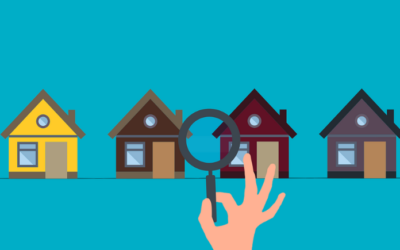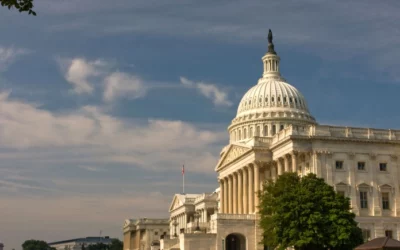
✏️ Editor’s Note: Realtor Associations, agents, and MLS’ have started implementing changes related to the NAR’s $418 million settlement. While home-sellers will likely save thousands in commission, compliance and litigation risks have significantly increased for sellers throughout the nation. Learn how NAR’s settlement affects home sellers.
The Kansas housing market is experiencing a major shift. Although the median sale price was up by 3.3% in April 2024 YoY, but the number of homes sold dropped by 23.0%.
Homes are staying on the market for longer as buyers struggle to find affordable housing with mortgage rates at a 20-year high of 6.79%.
Now that the housing market Kansas is threatened by a similar instance of rising mortgage rates and the possibility of a recession, buyers and homeowners are asking a familiar question: when will the housing market crash?
Key Takeaways
- Apparent Housing Bubble: The current real estate market is forming a bubble-like projection. Due to Inflated home prices, low inventory, and high mortgage rates.
- Housing Market Crash: Experts believe the real estate market will slow down but it will not crash anytime soon due to the minimum supply.
What is Real Estate Housing Market?
A real estate housing market or real estate market refers to a network of buyers and sellers looking to buy and sell real estate.
» Is Real Estate Housing Market Slowing Down in KS? Yes! Learn what happens to the Kansas housing market during a recession.
Common Housing Market Terms and Their Trends
1. Kansas Median Home Prices
Over a given period, the median home price is the middle sale price among all homes ranked from highest to lowest with respect to their market value.
» Current Housing Market Trend 2024: In April 2024, median home prices in Kansas were up by 3.3% compared to the last year.
2. Inventory
Inventory or homes for sale refers to the number of unsold residential and commercial real estate units.
» Current Housing Market Trend 2023: The supply of homes remains historically low, according to Lawrence Yun, NAR Chief Economist and Senior Vice President of Research. In April 2023, the inventory of unsold existing homes stood at 2.6 months.
3. Homes Sold
The Total number of properties sold during the period.
» Current Housing Market Trend 2023: According to the Redfin data, the total number of homes sold this year was at an all-time low of 23.0% compared to the last year.
4. Median Days on the Market
The median number of days a property spends on the market in a given geography during a specified period.
» Current Housing Market Trend 2023: The median days on the market was 18 days, down by 4 days Y-O-Y.
5. Mortgage Interest Rates
Mortgage lenders in Kansas charge interest rates on a mortgage. It can be fixed or variable depending upon the mortgage lender.
» Current Housing Market Trend 2023: The national average 30-year fixed rate mortgage rate is at 6.79% and up 1.7 points year over year.

Factors Affecting US Housing Market
Several parameters affect the real estate housing market prices. They are broadly categorized into 4 key segments.
1. Mortgage Interest Rates
Mortgage Interest rates significantly impact the current Kansas housing market. These rates have priced many buyers out of the market as they’re at record highs in more than 20 years.
Interest rates and home prices share an inverse relationship.
Once the interest rate decreases, the cost of obtaining a mortgage decreases, which increases demand for real estate and raises home prices in KS.
2. Economy
The real estate housing market varies by the overall health of the economy. Economic indicators include GDP, employment ratio, manufacturing activity, the prices of goods, etc.
The country’s economic power directly affects the housing markets in the US.
3. Demographics
Demographics defines the composition of the population based on age, race, gender, income, migration patterns, and growth.
It makes it easy to determine what types of real estate properties are in demand.
Major changes in a country’s demographics can have a long-term impact on current Kansas housing market trends.
4. Government Policies
Tax credits, deductions, and subsidiaries can impact the demand for real estate.
Understanding current government policies can help you predict the demand and supply and identify potentially false Kansas real estate market news.
What is a Housing Market Bubble?
A housing market bubble refers to a steep incline in prices with increasing demand and limited supply.
The demand continues to rise as more buyers jump into the market. Investors like flippers and wholesalers also show up and snag properties.
At last, home prices reach unreasonable levels, making it unaffordable for the average or even above-average buyer.
What Causes a Housing Market Bubble?
A housing market bubble is caused due to unsustainable home prices. Like any product or service, the price is determined by the relative demand and supply.
A variety of factors primarily causes a housing market bubble.
1. Rising Economic Prosperity
It refers to the phenomena where the income-to-price ratio of people is increasing. Goods and services become more affordable, and people gain more purchasing power.
2. Mortgage Interest Rates
As the mortgage rate decreases, it gets more convenient for the homebuyer to afford a home. Thus, demand increases, and prices rise as well.
3. Wider Mortgage Product Offerings
For a borrower, multiple types of mortgages are available such as adjustable rate mortgages (ARM), conventional loans, fixed-rate mortgages, and government-sponsored. Potential homebuyers have enough options to get a mortgage.
4. Credit Access
As it becomes easier for buyers to get a loan, the demand to finance a home consistently increases. Thus, home prices rise.
If one of these variables is taken out of the equation, the bubble pops.
Are We in a Housing Bubble Now?
Home prices have been steadily rising for the last two years. Inventory is still low, standing at 2.6 months’ supply.
Mortgage interest rates touched a record high, and there’s a sharp decline in the number of home sales at an all-time low of 23.0% YoY.
There has been a gradual decline in homebuyer interest. Experts would agree that a housing bubble does exist.
Why Does a Housing Bubble Burst?
A housing bubble bursts when demand decreases and supply increases.
Supply surges when builders continue to build, irrespective of the reduced demand for houses. The inevitable results are a decline in prices and sales.
Housing bubble bursts for a variety of reasons.
1. High Increase in the Interest Rates
An increase in interest rates makes homeownership unaffordable for more potential buyers. As a result, homes stay on the market for longer and sellers have to reduce the prices.
Even so, the housing bubble won’t burst until there is a massive supply of homes on the market.
2. Economic Downturn
The high demand for houses decreases when there’s a downtrend in the nation’s economy. With less disposable income, more layoffs, and few income opportunities, homebuyers resist buying a house in Kansas.
3. High Credit Standards
As Kansas mortgage lenders make it harder to get a loan, home affordability suffers and reduces the demand. As a result, supply increases, and prices drop.
What to Do in a Housing Bubble?
If you are a homeowner who lives in an area where home prices have started to rise, you must be considering selling your house.
Unless you have plans to downsize, rent, or relocate to a more affordable area, you’ll only be selling and entering the bubble.
Once your house sells, you’ll need to buy another one, so you’ll have to bid against other buyers in an overvalued market.
To avoid entering into a real estate transaction too early, it is best to wait and time the market.
When Will the Housing Market Crash in Kansas?
Economists believe the housing market will slow down but not crash soon.
Prices will fall, but not to the extent homeowners experienced during the Great Recession.
Let’s look at why most experts believe that the housing market is not going to crash.
5 Reasons Why the Housing Market is Unlikely to Crash
1. Low Inventory
As per May 2023 data, only a 2.6 month supply is available in the inventory. This ongoing scarcity of inventory explains why many buyers are still forced to bid up prices. Also, the supply-demand curve indicates that prices won’t crash shortly.
2. Lack of Newly Constructed Housing Supply
The supply of newly constructed houses has yet to return to pre-2007 levels. Also, there’s no way that they buy land, get regulatory approval, and increase the supply quickly.
3. Several New Buyers
There’s a strong demand for homes across various demographics. Millennials and Hispanics are in their prime buying years.
As a result, there’s still a limited amount of inventory available.
4. Strict Lending Standards
Back in 2007, there were multiple cases of liar loans did exist. In the past, lenders offered mortgages to anyone without doing any prior credit checks or down payments.
Lenders today place high standards on borrowers, and most who get mortgages have excellent credit.
5. Drop in Foreclosures
A majority of homeowners own significant equity in their homes. The personal balance sheets of homeowners are much stronger today than they were 15 years ago, which is a clear difference between now and then.
As a result, there is no threat of a foreclosure crisis.
💡Kansas Foreclosures: Foreclosure in any aspect is a negative situation. Learn about it so that you are aware.
Should I Buy a Home Now or Wait?
Yes, if you are in a stable financial position. 23% of respondents said now is a good time to buy a house.
Buying a home is the biggest investment opportunity for most people in their lifetime. Before you begin, make sure you have a solid financial condition.
A buyer is required to make a sound decision based on their needs, budget, and research.
Before proceeding, buyers must calculate their monthly housing costs using a mortgage calculator.
» How to Buy a House in Kansas: Own the Home Meant for You!
Tips for Buying a Home in a Hot Market
1. Increase Your Earning Potential
To buy or finance a house, it is necessary to be in a stable financial condition. Despite the economic downturn and rising mortgage rates, you must look for opportunities to boost your income.
60% of workers who switched jobs last year earned more money in their new positions, beating inflation.
2. Lower Your Debt
Lowering your debt-to-income ratio will help you easily qualify for a mortgage preapproval when applying for a loan.
If you have bills to pay, such as credit card balances, student loans, or asset installments, it is always better to clear them before making a huge commitment.
3. Research Local Markets
The Kansas real estate housing market is highly localized as market trends vary from region to region.
Also, the buyer closing costs depend upon each state and cost up to 4% to 5% of the home selling price.
To get the top dollar value for your money, it’s beneficial to focus on the local housing market in Kansas.
» Buyer Closing Cost Calculator: Evaluate the approximate closing costs for buyers in your area.
Tips for Buying a Home in a Slow Market
1. Don’t Buy at the Lowest Price
The Kansas real estate housing market starts to slow when the properties’ supply exceeds the present demand.
As a result, sellers have to lower the prices of their homes. However, you shouldn’t buy a home just because it’s the cheapest.
A seller may conceal the need for major repairs. These renovations may inflate the home’s value. A home inspector can help the buyer inspect the property thoroughly.
» Kansas Home Inspectors: Check out the best home inspectors available in your area.
2. Consider the Value of the Property
A slow market is the buyer’s market.
There is a high chance that the home values may decrease before it starts to increase again.
» Fair Market Value: Want to know what is fair market value and how is it calculated?
3. Do Not Invest in the Properties For the Short Run
If you’re not planning to stay in the real estate property for a long time, do not buy it.
Buying a home solely for selling will only increase inventory. Buyers might consider a mortgage with short due dates and high payments.
This won’t be beneficial in the long run if the Kansas housing market stays slow. A slow real estate market may force the buyer to refinance their new home.
» Best Time to Buy a House: Know exactly when it is best to buy a house!
Resources for Kansas Homebuyers
| Resources | Snippet |
| 1. Best Time to Buy House in Kansas | A majority of people don’t know when’s the best time to buy a house. Know exactly when’s the best month to buy a house. |
| 2. How to Buy a House With Bad Credit in Kansas | Around 16% of Americans have bad credit. Still, you can manage to buy a house and get a better deal. |
| 3. Kansas For Sale By Owner | Looking for a FSBO home? Get the list of best for sale by owner homes in your area. |
| 4. Closing Cost Calculator Kansas Buyer | A closing costs calculator for buyers gives you an estimate of your closing costs while buying a house after deducting local closing costs. |
| 5. Buying a House For Sale By Owner | Get to know about who pays the buyer agent in a for sale by owner transaction. |
| 6. Renting vs Buying Real Estate | Buying a home is critical to your American dream, but should you buy a house or continue to rent? |
Should I Sell a Home Now or Wait?
Yes! 10% of homeowners still believe that now is a good time to sell a home.
A few sellers are still in a dilemma considering the slow market, high inventory, decreasing home prices, and increasing mortgage rates.
Sellers can crack a great deal by leveraging high buyer demand.
However, sellers can benefit from selling a house if the following factors favor them.
1. If the Mortgage Interest Rates are Low
Mortgage rates are touching a record high of 7.08% and may rise even further as the Federal Reserve works to control inflation.
When comparing the data to 1971, the present mortgage rate is moving towards a long-term average of 8% 30-year mortgage rates.
Keeping this in mind, Interest rates are still low, which might lure prospective buyers into entering the market.
2. If You Need to Relocate
If you’ve got a new job or decided to retire, relocate to a new state. There is no way around selling. The best time to sell a house is when you’re ready to move.
3. If You Need to Upsize or Downsize
Everyone enjoys their own space, and a growing family often requires more space. Whether you’ve decided to upsize or downsize to live in a low-maintenance home.
A change in family dynamics can significantly impact your decision to sell your home.
Tips to Sell Your Home in Hot Market
1. Decide a Way to Sell For Top Dollar:
It is important to select how you want to sell your house. You can sell your house to cash buyers, IBuyer, or anyone else.
Doesn’t matter if you’re in a hot seller’s market or a slow buyer’s market. Listing on MLS is the best way to sell a house. Almost 90% of buyers are represented by a buyer agent who shares access to the local MLS.
Listings on the MLS sell 17% faster than those that are not.
» What is MLS in Real Estate: Everything You Need to Know.
2. Make Necessary Repairs
To get the highest and best offer on your property, it is necessary to invest in repairs and renovations.
You should also try to clean and declutter your home so prospective buyers can see the living areas.
Making a strong first impression extends to your home’s exterior. It is important to freshen up the curb appeal before potential buyers arrive.
» Creative Ways To Market a House For Sale: Learn how to creatively market your home.
3. Go for Home Staging
Home staging means preparing your home for sale with or without the help of a professional home stager.
Staging a home for sale largely involves cleaning, rearranging, or renting furniture and other aesthetic tactics to make your home visually appealing.
However, it largely depends on the location and the number of rooms you want to stage.
» How Much Does Home Staging Cost: Home sellers spend $755 – $2,844 on home staging. However, it depends on the location.
Resources for Selling a Home in a Hot Market
| Resources | Snippet |
| 1. Sell My House Fast for Cash | Explore multiple ways to sell your home fast for cash. |
| 2. Kansas Cash Home Buyers | Companies that buy houses for cash fiercely compete for properties during a hot seller market. |
| 3. Cash Offer Kansas | Almost one-third of US homes sold in July 2022 were all-cash transactions. Want to get one? |
| 4. Kansas Closing Costs for Seller | Fees and taxes can vary from one county to another in Kansas. Learn them here. |
| 5. Seller Closing Costs Kansas Calculator | Want to get a net proceeds estimate? Look up here. |
| 6. Best Websites for FSBO | Selling FSBO saves you thousands in commission, check out best FSBO sites. |
Tips to Sell Your Home In A Slow Market
1. Price Your Home Competitively
In a slow market, inventory is usually high, and home prices keep decreasing due to lower demand. It is better to price your home competitively and get the best deal.
Research comparable house sales in the area and undercut them.
Redfin’s data tells us how a typical home sells for less than the asking price. If you are going to price your home high, there are chances that you may detract potential buyers.
2. Ease the Deal
Selling a house is not an easy task in a slow market. With mortgage rates at peak, buyers are already resisting entering the market.
You must make the deal look more attractive to sell your house in a slow market.
Offer financial incentives like covering all closing costs, accepting all costs of Kansas property inspections, or providing a transferable home warranty.
» Closing Costs in Kansas for Buyer: Find your Closing Costs Obligations
3. Find a Way to Get the Best Deal
The first and foremost step is to find a medium to sell your house for top dollar. List your property on MLS for the best results.
List your property on MLS for the best results. We do not recommend listing with full-service Kansas real estate agents as they charge hefty commissions.
Top real estate agents in Kansas provide access to the MLS, but you can skip this and list on MLS via the Flat Fee MLS Kansas listing service.
» How to List a House on MLS: Learn about various ways of getting on the MLS.
Resources for Selling a Home in a Slow Market
| Resources | Snippet |
| 1. Best Time to Sell a House in Kansas | Is this a right time to sell? Get a clear insight here. |
| 2. How to Sell Your Own House in Kansas | Selling FSBO in Kansas is more popular and high-tech than ever. |
| 3. Sell My House Fast Kansas | Learn the ways to sell your home fast. |
| 4. How to Sell a House in Kansas | Know how to get the best deal while selling a house in Kansas. |
| 5. Can You Sell a House As Is in Kansas | Want to sell a distressed property? Know how to sell as is. |
| 6. Flat-Fee MLS | Save on 3% listing agent commission in this slowing housing market. Sell FSBO! |
Kansas Housing Market Predictions 2023
Surged mortgage rates and plunged home sales have worried buyers and sellers about the housing market trend in 2023.
Home sales are down by 23.0% year-over-year, and National Avg. 30-year fixed mortgage rate ranges from 6% to 7.1%.
This indicates that the rate of existing home sales has slowed to its lowest level in 10 years.
Here are a few real estate housing market predictions for 2023 based on the experts’ forecast.
1. Higher Mortgage Interest Rates
Experts predict that mortgage rates will continue to climb because of continued inflation, potential recession, and geopolitical tensions.
Financial market participants anticipate the Fed raising its target Fed funds rate by 175 to 200 basis points from current levels.
This will roughly average the 30-year and 15-year mortgage rates at 8.50 and 7.70, respectively.
2. Lower Home Sales
Increasing mortgage rates will surely have a major impact on home sales in 2023.
With the observed trend, higher interest rates could cause a 10% drop in home sales next year.
Home listings will no longer go out of inventory at a faster pace.
3. Lower Home Prices
Some experts predict that due to low inventory, home prices won’t drop in 2023.
While others believe that due to the higher interest rates, sellers will lower their prices to current levels.
Home values are expected to go down by 5% to 10% due to unaffordability. As the Fed attempts to control inflation by increasing mortgage rates.
4. Lower Housing Supply / Inventory
Before the 2008 housing market crash, the housing supply or inventory peaked at a 13-month supply.
We only have enough for 3.5 months’ supply, of inventory.
Homeowners are unlikely to trade in their 3% mortgage for a new home with a 7% loan unless necessary. As a result, there are chances that the housing supply will remain low.
5. Lower Home Affordability
Experts believe that home affordability will not change dramatically.
Home prices may continue to fall but will not be enough to offset the higher interest rate.
As a result, the monthly mortgage payment will remain high, and homes may look less affordable.
Kansas Housing Market Predictions for the Next 5 Years
NAR Chief Economist predicts that “Mortgage rates will continue to rise in 2023, but within two years rate should return to 5.5% or 6% percent.”
Yun also anticipates that over the next 5 years, home prices will elevate by 15% to 25%
Many sellers waiting for the market to turn around will likely give in and increase the inventory.
Yun predicts a balanced market in which neither buyer nor seller has a monopoly. Until housing inventory remains low.
But In the long run, the seller’s market will continue.
Final Thoughts
The KS housing market has been red hot since the pandemic, but it is cooling fast. Prices will fall, but not to the extent homeowners experienced during the Great Recession.
The personal balance sheets of homeowners today are much stronger than they were 15 years ago.
A typical mortgage borrower has excellent credit, substantial equity, and a fixed-rate mortgage with a rate well below 5%. As a result, no foreclosure crisis is on the horizon.
Furthermore, builders remember the Great Recession well and have been cautious in their construction pace. Hence, there was an ongoing shortage of available homes for sale by 2.6 months’ supply in May 2023.
Thus, if there is a high demand from buyers in your area, you can benefit from the slow market by selling your home.
Disclaimer: The views and opinions expressed herein are those of the author and do not necessarily reflect the views of Houzeo Corp., its affiliates, or its employees. The information set forth herein has been obtained or derived from sources believed by the author to be reliable. However, the author does not make any representation or warranty, express or implied, as to the information’s accuracy or completeness, nor does the author recommend that the attached information serve as the basis of any investment decision and it has been provided to you solely for informational purposes only and does not constitute an offer or solicitation of an offer, or any advice or recommendation.
Frequently Asked Questions
1. Is the housing market going to crash in Kansas?
Economists do not believe that the real estate housing market will crash. According to housing economists, there are five significant reasons why the market will not crash anytime soon: Low inventory, Lack of newly constructed housing supply, Several new buyers, Strict lending standards, and a Drop in foreclosures.
2. What are the real estate housing market 2023 predictions?
NAR Chief Economist predicts that “Mortgage rates will continue to rise in 2023, but within two years rate should return to 5.5% or 6%.” He also anticipates that home prices will elevate over the next 5 years from 15% to 25%. Next year, there might be a chance that it will be a buyers’ housing real estate market.
3. Will real estate house market value continue to fall?
Yes! If the mortgage rates continue to rise and houses stay on the market for longer, the real estate market value will continue to fall.
4. What causes a housing market crash?
A housing market crashes when there’s an immense supply of properties and few buyers to purchase. In short, huge supply and minimum demand.
A housing market bubble starts to form when mortgages are available at low-interest rates, substantial job growth, and lenders easily avail the loan.
The bubble pops up when the equation is reversed.
5. What causes housing prices to fall?
Two prominent reasons cause housing prices to fall.
- Rising Interest Rates: As the mortgage rates increases, there’s a sharp increase in the cost of variable mortgage payment. Affordability becomes difficult for homebuyers. As a result, demand drops, and home prices fall.
- Economic Downturn: An economic downturn leads to less disposable income, fewer job openings, and higher unemployment. This eventually decreases the demand for housing, resulting in a drop in home prices.
Also Read
- Real Estate Housing Market: The housing market refers to properties bought and sold directly to buyers or through real estate brokers.
- Housing Market Recession: Is the real estate market slowing down? Check out our in-depth research and comprehensive guide.
- Housing Market Crash: When will the real estate housing market crash? Find out now!
- Fair Market Value: Learn what is Fair Market Value and how is it calculated.
- Real Estate Market Analysis: Market research is the first step any investor must take before entering the market. Read more to know about it.
- How Much are Closing Costs on a Home in Kansas: The seller and the buyer both pay closing costs in Kansas. Know them before closing.
- Flipping Houses in Kansas: Read our blog on how to flip and maximize your profits.
- Wholesale Real Estate Kansas: Discover how real estate wholesaling laws work.
- For Sale By Owner Free Listing Sites: Selling FSBO saves you thousands in commission, check out free FSBO sites.
- Flat Fee MLS Listing: Full-service or flat-fee MLS? Find out which is better!
Related: real estate in Kansas, Kansas real estate for sale, KS housing market slow down, housing market cooling, house prices in Kansas, Kansas housing prices, cheapest homes in Kansas, KS housing market, house market Kansas, Kansas market, cheapest real estate in Kansas, Kansas house prices, Kansas hot pocket, redfin market data, home prices Kansas, Kansas real estate investment, condo prices in Kansas, Kansas housing, KS real estate market, real estate market in KS, Kansas real estate market statistics, housing market forecast Kansas, housing market Kansas, Kansas house market, Kansas real estate news, real estate market in Kansas, KS housing market forecast 2023 fsbo.com reviews, houszeo, Best FSBO sites in Kansas, list on MLS in Kansas, companies that buy houses for cash in Kansas, selling a house without a realtor in Kansas, best real estate agents in Kansas, best mortgage brokers in Kansas, best mortgage lenders in Kansas, best real estate photographers in Kansas, low commission real estate agents Kansas





